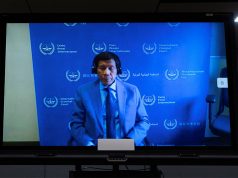MANILA, Philippines — The Senate resumed its inquiry into the proliferation of fake news with Senator Grace Poe lamenting: “Ito na ba ang kinahinatnan ng bayan natin ngayon? Hostage ng (Is this what our country has come to? A hostage of) fake information … intolerant of other people’s views.”
Poe, who chairs the committee on public information and mass media, noted in her opening statement: “Totoo ‘yung kasabihan na (The saying is true that), ‘Truth has become such a valuable and important commodity, that it is immediately surrounded by a bodyguard of lies’.”
The second hearing of the Poe committee comes in the wake of the Securities and Exchange Commission order revoking the registration of news site Rappler for allegedly violating the Constitutional prohibition against foreign ownership.
The SEC order has stirred outrage among press freedom and free expression groups here and abroad, giving rise to accusations that government is out to clamp down on critical media and even to establish autocratic rule.
Major media outfits, including TV5 and InterAksyon, and Rappler, sent representatives to the hearing. Most of the media resource persons were dressed in black as a sign of protest against the perceived repression of press freedom.
She said the hearing would seek to understand:
- The extent of responsibility and accountability of bloggers and journalists in spreading misinformation
- The effect of online platforms like Facebook in shaping public opinion and facilitating the spread of misinformation
- The accountability of government for the use or misuse of resources in spreading disinformation or suppressing the truth.
At the same time, noting how bloggers have been accused of being major drivers of disinformation, said she believed they “are not above libel laws. If a blogger passes on information that he claims are facts, but which later turn out to be false, we should be able to hold him accountable.”
“And though we support a person’s right to freedom of expression, once that writer defames the subject of his article, that writer must be held liable in accordance with our laws,” she addd.
But she also pointed out that media were not blameless either.
“Fake news has two parts,” she noted. “I mentioned the first one, the medium. The second part is the content. The people behind that content, the journalists and the bloggers, are also responsible for the spread of fake news. We can’t really say just bloggers, some of them are mainstream journalists.”
Poe also urged “vigilance against silencing of dissent,” noting that “aside from bloggers and journalists, there is another player in the social media arena — the government,” and that “authoritarian regimes have used public resources to spread misinformation, silence dissent, and slander opponents through social media.”
“Aanhin mo ang batas na nagsusulong sa (What use is a law advancing) Freedom of Information kung pekeng balita rin naman ang ibibigay sa’yo ng gobyerno (if what the government gives you is fake news)?” she asked.
“Government regulation that borders on intimidation and harassment of journalists is another means of suppressing the truth,” Poe added. “Let us remember, the constitution gives the people the right to information and protects freedom of the press.”
Poe said social media giant Facebook had been invited but “cannot attend today due to internal organization changes.”
It did submit a position paper that she said “states that they make use of products and have partnerships and programs to promote authentic communications and stop fake news. Based on their letter, it appears that their efforts are lacking since admittedly, they do not delete false news from the platform that was created with authentic accounts.”
Communications Secretary Martin Andanar, who heads the Presidential Communications Operations Office, acknowledged that “the proliferation of fake news is a pressing issue that needs to be addressed immediately.”
However, responding to suggestions that legislation be introduced against fake news, Andanar shared the position several media organizations had earlier shared, that no new law is needed and that the best way to combat disinformation and misinformation is through the truth and increased media and information literacy among people.
He also suggested they be given a larger budget for media and information literacy.
Andanar also noted that there are existing laws “that can be tapped” by victims of disinformation to seek redress, such as the Revised Penal Code, specifically the provisions against unlawful publication and libel, which remains a criminal offense, and the Cybercrime Prevention Act.
Interestingly, Andanar also drew from a military counterinsurgency term, proposing a “whole of society approach” to battle fake news, but without elaborating on the context of its usage.
Notable absent from the hearing was Andanar’s controversial assistant secretary, Mocha Uson, who has often been accused of being a major source of fake news.









